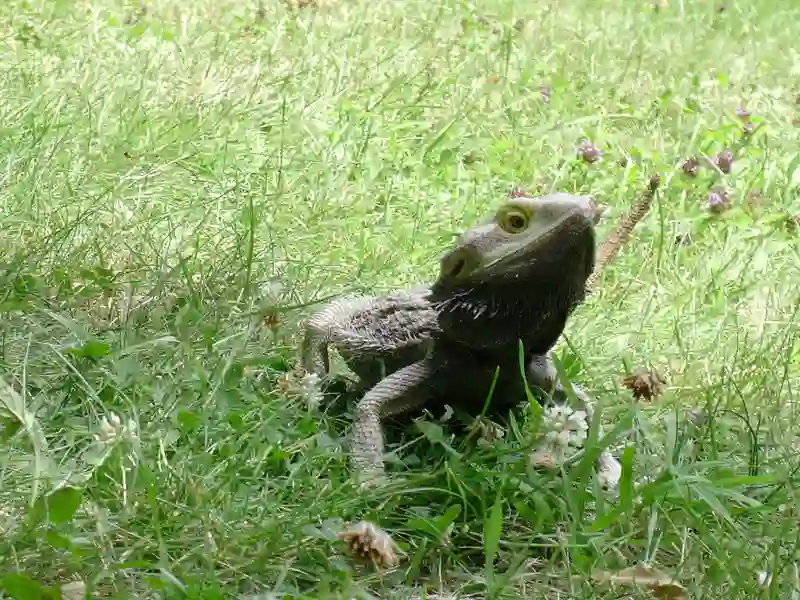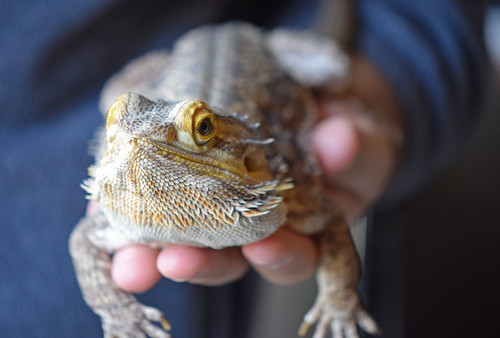A bearded dragon can become lethargic during the winter due to a natural process called brumation, which is a hibernation-like state many cold-blooded animals undergo. When a bearded dragon is in brumation, it may sleep for days or even weeks, and its appetite will decrease along with its activity levels.
When the bearded dragon reaches the right age, this is a normal process, so do not worry about it. It is important to seek the advice of a reptile veterinarian as soon as possible, however, if the problem does not seem to be a shedding issue or if you notice a discharge from the eyes.
In this article, I will discuss the common causes of winter lethargy in Bearded Dragons, and provide tips on how to prevent and treat this issue. So, if your Bearded Dragon is exhibiting signs of winter lethargy, please read on to find out what you can do to help them.
Causes of Lethargy in Bearded Dragons
Bearded dragons are cold-blooded reptiles that come from the arid regions of Australia. In the wild, they would retreat to burrows or other underground structures during the winter months to avoid the harsh temperatures and lack of food.
As such, bearded dragons have evolved to enter a state of brumation or hibernation-like state when their environment gets too cold.
During this time, their metabolic rate decreases, and they conserve energy by becoming less active. This is a natural response that helps them survive through the winter as it allows them to reduce their energy requirements.
Dehydration is another common cause of lethargy in bearded dragons during the winter months. The dry air inside most homes can lead to dehydration, which can impact your pet’s health and well-being.
Bearded dragons need plenty of water to stay hydrated, and dehydration can quickly lead to lethargy and other health problems if not addressed promptly. Providing clean fresh water regularly is essential for keeping your bearded dragon healthy during this period.
Malnutrition is another common cause of lethargy in bearded dragons during winter months. For example, if you feed your pet an unbalanced diet low in nutrients like calcium or vitamin D3 , it can cause metabolic bone disease (MBD).
This condition results from poor calcium metabolism due to a lack or imbalance of minerals and vitamins in the diet provided for your beardie. MBD affects bone development leading to lethargy, tremors or even death if untreated early on enough!
Signs of Lethargy in Bearded Dragons
Bearded dragons are known for their energetic and lively behavior. However, during winter they tend to become lethargic and less active.
This is a natural response to the decrease in temperature and daylight hours. As a responsible pet owner, it is important to recognize the signs of lethargy in your bearded dragon so that you can take appropriate action.
Sleeping more than usual
One of the most common signs of lethargy in bearded dragons is sleeping more than usual. If your pet seems to be sleeping throughout the day, rather than being active as they normally would be, this could be an indication that they are feeling lethargic. It is important to differentiate between regular sleep cycles and true lethargy.
To determine if your bearded dragon is experiencing lethargy, monitor their sleeping patterns closely. If they seem to be sleeping for longer periods during the day or if they are difficult to wake up from sleep, it may be time to take action.
Lack of appetite
Another sign of lethargy in bearded dragons is a lack of appetite. During winter months when their metabolic rate slows down, it’s normal for them to eat less and have less frequent bowel movements compared to warmer months; however, if you notice a significant decrease or complete loss of appetite, this may indicate something more serious.
If your bearded dragon isn’t eating normally then check if there are other symptoms such as respiratory distress or vomiting which may indicate underlying health issues causing this lack of appetite.
Slow movements and reduced activity levels
Slow movements and reduced activity levels are also indicators that your pet may not feel well. Bearded dragons are typically active creatures who enjoy basking under heat lamps or UVB lights; however, if they are less active than usual or seem to be moving slower than normal, it’s a sign that they may be lethargic.
Lack of movement can also lead to stiff joints and muscle atrophy. Therefore, it is important to keep a close eye on your pet’s activity level and take action if you notice any significant changes.
Steps to Take if Your Bearded Dragon is Lethargic
Check the temperature and lighting conditions
One of the most common reasons for lethargy in bearded dragons during winter is due to incorrect temperatures and lighting conditions. Bearded dragons require specific temperatures and UV lighting to regulate their body temperature, digestion, and overall health.
The basking area should be around 105-110°F, with a cooler side of the enclosure at around 75°F. The UVB lighting should be on for a minimum of 10 hours per day.
If these conditions are not met, it can cause lethargy in your pet. To ensure proper temperature and lighting conditions, use thermometers and timers.
Adjust the placement or wattage of heat lamps or UVB bulbs if necessary. Additionally, make sure there are no obstructions blocking the light from reaching your pet’s basking area.
Increase hydration by offering more water and misting the enclosure
Dehydration is another common cause of lethargy in bearded dragons during winter. In their natural habitat, they get moisture from food sources such as insects and vegetation as well as dew drops on plants early in the morning. However, when kept in captivity during winter months they may not receive enough moisture this way.
To increase hydration levels for your bearded dragon offer daily baths or showers in lukewarm water that does not go above their chest level. Misting their enclosure with water once or twice per day will also help maintain humidity levels which helps them stay hydrated.
Provide a balanced diet with proper nutrition
A lack of proper nutrition can lead to malnutrition which can then result in lethargy symptoms among other issues for your pet.
Make sure you are feeding your bearded dragon a balanced diet consisting mainly of vegetables along with appropriate protein sources such as insects. Avoid feeding your pet too many fruits or vegetables that are high in sugar or oxalates.
Consult with a veterinarian for specific dietary recommendations based on your bearded dragon’s age and size. Be sure to provide vitamin supplements when necessary, especially during winter months where outdoor exposure to sunlight is limited.
Consult a veterinarian if necessary
If you have tried adjusting temperature, lighting, hydration and diet without seeing any improvements in your bearded dragon’s lethargy behavior, it may be time to consult with a veterinarian who specializes in reptile care.
They can perform a physical exam and run diagnostic tests if needed to determine the underlying cause of the issue. Remember that early intervention can make all the difference for your pet’s health and well-being.
Conclusion
Lethargy in bearded dragons during the winter months can be a concerning issue. It is important to recognize the signs of lethargy and take action early on to ensure your pet’s health and well-being. By following the steps outlined in this article, you can help your bearded dragon stay healthy and active throughout the winter season.
Firstly, it is crucial to understand the causes of lethargy in bearded dragons including hibernation-like state, dehydration, malnutrition or illness/infection. Once you have identified these causes, it becomes easier to take appropriate action towards addressing them.
Secondly, recognizing signs of lethargy and taking immediate action is key. By ensuring proper temperature and lighting conditions for your pet’s enclosure as well as providing a balanced diet with adequate nutrition and hydration levels will prevent potential health issues from developing.
Encouraging a close monitoring of your pet’s behavior during winter months is essential in detecting any changes early on before they escalate into bigger problems. Be proactive by scheduling regular wellness check-ups with your veterinarian to keep your bearded dragon healthy throughout its lifetime.
Remember that while lethargy may seem like a small problem at first glance, it can quickly develop into serious health concerns if left untreated. Therefore, taking necessary precautions and monitoring closely will go a long way towards keeping your pet healthy throughout winter months!



Leave a Reply